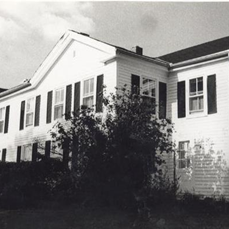The book, “Choice Seed in the
Wilderness,” written by Lillian Russell Porter in 1964 is based on the diary of
Ann Eliza Bacon, who married Joseph K. P. Porter and moved to Cooksville in
1847 from Massachusetts. Eliza, as she was called, was the “choice seed” in the
“wilderness” that became her new home near the Village of Cooksville in the Wisconsin Territory. And she
blossomed in the wilds of her frontier community.
Together, these two Porter women—Eliza
(1821-1890) and Lillian (1892- 1976), both of whom married into the Porter
family— tell a charming story of the first Porters to move to the “wilderness”
of the Wisconsin Territory. Lillian’s grandmother Eliza lived, thrived and
enjoyed life in the 19th century alongside the Badfish Creek in the neighboring
villages of Cooksville (1842) and Waucoma (1846).
Lillian Porter’s1964 book used Eliza’s 19th-century diary
and other historical resources to re-create the trials and tribulations of
settling the newly-opened Territory— beginning a new life, establishing a
frontier home, and participating in a new social and cultural community, so different
in many ways from her Boston home.
The history of the Porters in Cooksville
is well-documented. It begins with the
purchase of land in northern Rock County by the famous U.S. Senator Daniel
Webster in 1837 when the land was first sold to pioneers by the U. S. government. Webster then sold some of his land, at a
profit, to his Massachusetts’s neighbor, Dr. John Porter, in 1842—which was the year that the Cook brothers had founded their new Village of Cooksville by the
Badfish Creek located just to the west of Porter’s newly-purchased land.
Dr. Porter, like other investors in
the frontier, sought out the choice land where woods, water and wheat-growing
soil was plentiful, and he set about improving his investment by creating on
paper the Village of Waucoma in 1846, next to Cooksville. These two villages became
the first in northern Rock County, besides the early stagecoach stop of Union,
three miles to the west.
In that same year, Dr. Porter, along
with his nephew Joseph K. P. Porter (1819-1907) first visited his land and his
newly-platted but unbuilt village. Porter granted to young Joseph the power of
attorney to bargain, sell, and convey his land in Wisconsin, including in his new
village, hoping to profit from America’s growing movement to the West. And young
Joseph also began constructing his farmhouse and barn to the east of the Village of Waucoma
along the Badfish Creek, in anticipation of marrying Ann Eliza Bacon and
settling permanently in the wilds of Wisconsin. Uncle and nephew then returned
to Massachusetts.
On February 21, 1847, Joseph
married Ann Eliza in Lowell, Massachusetts. He soon set off for Wisconsin again,
alone, to continue his preparations of a home in the “wilderness” for his new
“choice” bride.
 |
| The Porter Farmhouse, 1867, with family and hired help |
The Porter Farmhouse was completed in
1847 just east of the Village of Waucoma, and Eliza joined him there on September 10.
She had traveled for many days on the usual route to Wisconsin from Massachusetts by boat via
the Erie Canal and into the Great Lakes to Milwaukee, thence by stagecoach for
about 24 hours to Janesville, and then another 20 miles further on to Union, the
stagecoach stop mid-way between Janesville and Madison. Mr. William Dudley, a
traveling companion from Massachusetts on his way to Rutland (near Union) was to drive Eliza the
last three miles to Cooksville in his buggy from Union. But just after they
departed Union, Joseph Porter came riding up in “a cloud of dust” on a pony,
and he and his new wife rode in the buggy to their “new home in the West,” while
Mr. Dudley rode the pony. A romantic beginning to the Porters’ new life.
The Porters developed a prosperous
farming and merchandise business in the Cooksville-Waucoma area and were eventually
joined by Joseph’s brothers, Isaac and William, who settled in Cooksville. Over
the years Eliza and Joseph enlarged their farmhouse and their family and became
leading members of the community.
Eliza Porter was especially active in
the 19th-century social and cultural life of Cooksville. She had her
piano delivered from Massachusetts, presented many solo and choral musical performances
in the village and was noted for her large dinner and dance parties and
her poetic recitations at local celebrations. For instance, she sang “The
Star-Spangled Banner” at the May 15, 1861, meeting at which the Town of Porter
resolved to “maintain the Union” as the Civil War commenced.
 |
| Porter Farmhouse, 1895 |
Eliza’s story, told in “Choice Seed
in the Wilderness,” helped create that famous epigram about the historic
Village of Cooksville: “a wee bit of New England in Wisconsin.” Some of the
Porter descendents still live in the area, and the Porter Farmstead was listed
in the National Register of Historic Places in 1980, as were Isaac’s and
William’s residences in the Cooksville Historic District.
Lillian Russell Porter, the author
of the 1964 book was married to Joseph K. P. Porter (1885-1971), named after
his grandfather, the original settler. The book is now out of print, so copies
are difficult to find. If one is spotted, snatch it up and enjoy it, and
perhaps pass it on to others or to the Cooksville Archives to be shared with
others. Full title and publisher are: “Choice Seed in the Wilderness, From the
Diary of Ann Eliza Bacon Porter, Cooksville, Wisconsin, 1845-1890,” by Lillian
Russell Porter, published by Seth Low Press, Rockland, Maine, 1964.
 |
| The Porter Farmhouse Today |



The book is wonderful and available at area libraries. Copies for purchase appear to be unusual though Abebooks had one for $40.
ReplyDelete